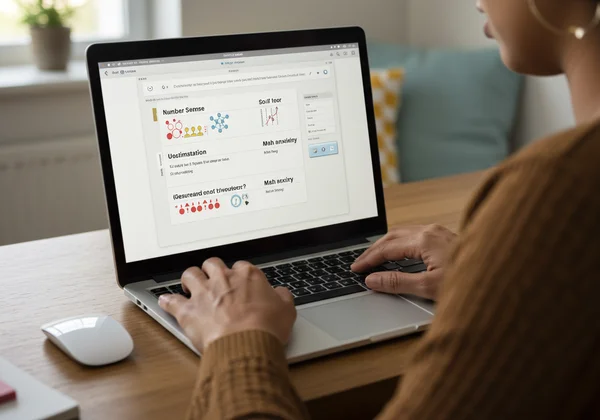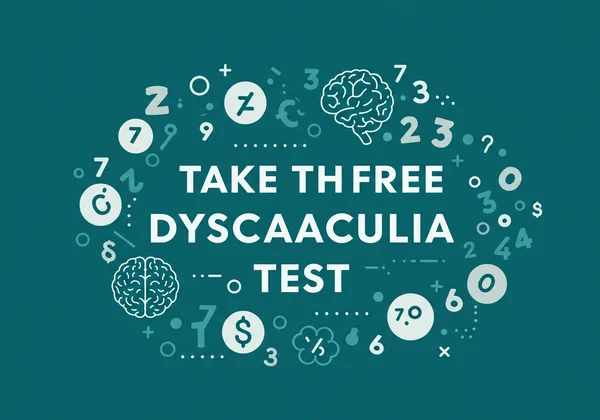แบบทดสอบ Dyscalculia ฟรีสำหรับผู้ใหญ่: เหนือกว่าคำว่า "ไม่เก่งคณิตศาสตร์" – การเดินทางส่วนตัว
October 27, 2025 | By Aisha Bennett
ตลอดชีวิตส่วนใหญ่ของฉัน ฉันสวมป้ายว่า "ไม่เก่งคณิตศาสตร์" ราวกับเสื้อโค้ทหนักอึ้งที่ถอดไม่ออก มันกำหนดทางเลือกของฉันในโรงเรียน มีอิทธิพลต่อเส้นทางอาชีพของฉัน และทำให้ฉันรู้สึกกังวลใจอยู่ลึกๆ ทุกครั้งที่ต้องคำนวณทิปหรือหารบิล ฉันเพียงแค่ยอมรับว่ามันเป็นข้อบกพร่องส่วนตัว แต่ถ้ามันเป็นมากกว่านั้นล่ะ? นี่คือเรื่องราวที่ฉันหยุดโทษตัวเองและเริ่มทำความเข้าใจสมองของฉัน การเดินทางที่เริ่มต้นด้วยคำถามง่ายๆ แต่ทรงพลังที่ว่า: ฉันมีภาวะ Dyscalculia หรือแค่ไม่เก่งคณิตศาสตร์กันแน่? หากคำถามนี้โดนใจคุณอย่างลึกซึ้ง เรื่องราวของฉันอาจเป็นเรื่องราวของคุณเช่นกัน มันคือการเดินทางแห่งการค้นพบที่เริ่มต้นด้วยการทำความเข้าใจ ภาวะ Dyscalculia ในผู้ใหญ่
"ฉันคิดว่าแค่ไม่เก่งคณิตศาสตร์": หลายปีของการต่อสู้ที่ไม่ได้วินิจฉัย
วลีที่ว่า "ฉันไม่ใช่คนชอบตัวเลข" คือเกราะป้องกันของฉัน ฉันใช้มันเพื่อกลบเกลื่อนความตื่นตระหนกที่แท้จริงที่ฉันรู้สึกเมื่อต้องเผชิญกับตัวเลข มันไม่ใช่แค่พีชคณิตที่ซับซ้อน แต่เป็นคณิตศาสตร์ในชีวิตประจำวันที่ดูเหมือนง่ายดายสำหรับคนอื่นๆ ความยากลำบากที่ยาวนานนี้ไม่ใช่การขาดความพยายาม แต่มันเป็นอุปสรรคที่มองไม่เห็นอย่างต่อเนื่องที่ส่งผลกระทบต่อชีวิตของฉันมากกว่าที่ฉันเคยอยากจะยอมรับ การทำความเข้าใจปัญหาเหล่านี้เป็นก้าวแรกสู่การค้นหาคำตอบ และมันอาจเป็นของคุณเช่นกัน จุดเริ่มต้นที่ดีคือการใช้ เครื่องมือคัดกรองฟรี
ผลกระทบในชีวิตประจำวัน: การจัดการตัวเลขในวัยผู้ใหญ่
การใช้ชีวิตอยู่กับภาวะ Dyscalculia ที่ไม่ได้รับการวินิจฉัยในวัยผู้ใหญ่ คือความวิตกกังวลเล็กๆ น้อยๆ ที่เกิดขึ้นเป็นประจำทุกวันที่สะสมกันจนกลายเป็นภูเขาแห่งความไม่มั่นใจในตนเอง ลองจินตนาการถึงความเครียดจากการพยายามทำตามสูตรอาหารที่มีเศษส่วน ความอับอายของการทอนเงินที่ร้านค้า หรือความยากลำบากในการอ่านนาฬิกาแบบเข็ม สำหรับฉัน การทำงบประมาณเป็นฝันร้ายของการสลับตำแหน่งตัวเลขและจุดทศนิยมที่ผิดพลาด การวางแผนการเดินทางมาพร้อมกับความวิตกกังวลอย่างมากในการคำนวณเวลาเดินทางและค่าใช้จ่าย สิ่งเหล่านี้ไม่ใช่สัญญาณของความสะเพร่า แต่เป็นประสบการณ์ทั่วไปสำหรับผู้ใหญ่ที่มีภาวะ Dyscalculia ความรู้สึกเชิงจำนวน ที่คนอื่นมองว่าเป็นเรื่องปกติอาจรู้สึกเหมือนเป็นภาษาต่างประเทศ ทำให้งานง่ายๆ รู้สึกซับซ้อนเกินรับมือ

สัญญาณที่ซ่อนอยู่: เมื่อความวิตกกังวลทางคณิตศาสตร์ไม่ใช่ทั้งหมดของเรื่องราว
พวกเราหลายคนสับสนระหว่างภาวะ Dyscalculia กับ ความวิตกกังวลทางคณิตศาสตร์ ที่รุนแรง แม้ว่าความวิตกกังวลจะเป็นส่วนหนึ่งของประสบการณ์ที่แท้จริงและที่บั่นทอน แต่บ่อยครั้งมันเป็นอาการ ไม่ใช่สาเหตุหลัก ความวิตกกังวลของฉันเกิดจากประสบการณ์ที่น่าหงุดหงิดตลอดชีวิตที่สมองของฉันไม่ยอมร่วมมือ นอกเหนือจากการตอบสนองทางอารมณ์แล้ว ยังมีสัญญาณอื่นๆ อีก: ฉันมีปัญหาเรื่องทิศทาง พยายามจำเบอร์โทรศัพท์หรือวันที่ และพบว่ามันยากที่จะจินตนาการตัวเลขหรือประมาณปริมาณ การแยกแยะระหว่างความกลัวคณิตศาสตร์กับความยากลำบากพื้นฐานในการประมวลผลตัวเลขเป็นสิ่งสำคัญ หนึ่งคือการตอบสนองทางอารมณ์ อีกอย่างคือ ความแตกต่างทางการเรียนรู้ การตระหนักถึงความแตกต่างนี้คือความก้าวหน้าครั้งแรกที่แท้จริงของฉัน
จุดเปลี่ยน: การค้นพบภาวะ Dyscalculia ในผู้ใหญ่
ช่วงเวลาที่ฉันเข้าใจอย่างแจ่มแจ้งไม่ได้เกิดขึ้นในห้องเรียนหรือสำนักงานแพทย์ แต่เป็นช่วงดึกคืนหนึ่งขณะเลื่อนดูบทความออนไลน์ บทความนั้นอธิบายถึงความแตกต่างทางการเรียนรู้ที่เรียกว่า Dyscalculia และเมื่อฉันอ่านรายการอาการ มันรู้สึกเหมือนมีคนเขียนชีวประวัติสมองของฉัน ทุกข้อ — ตั้งแต่ปัญหาในการคิดเลขในใจไปจนถึงความยากลำบากในการใช้เหตุผลเชิงพื้นที่ — เป็นภาพสะท้อนที่สมบูรณ์แบบของปัญหาที่ฉันเผชิญมาตลอดชีวิต นี่เป็นครั้งแรกที่ฉันตระหนักว่าปัญหาของฉันมีชื่อ การค้นพบนี้เป็นมากกว่าแค่ฉลาก มันเป็นเส้นชีวิตที่นำฉันไปสู่การค้นหาเส้นทาง การวินิจฉัยภาวะ Dyscalculia ในผู้ใหญ่
พลังของการคัดกรอง: การยืนยันความยากลำบากที่รู้สึกมานาน
ด้วยความหวังแต่ก็ระมัดระวัง ฉันเริ่มค้นหาคำตอบ นั่นคือตอนที่ฉันพบบท ทดสอบ Dyscalculia ออนไลน์ฟรี การทำแบบทดสอบนั้นรู้สึกเหมือนเป็นก้าวที่ยิ่งใหญ่ มันไม่ใช่เรื่องของการได้คะแนน แต่มันเป็นเรื่องของการต้องการการยืนยันสำหรับการรู้สึกไม่เพียงพอมาหลายทศวรรษ คำถามถูกออกแบบมาเพื่อประเมินสิ่งที่ฉันประสบปัญหา — การเปรียบเทียบตัวเลข การประมาณค่า และทักษะชีวิตที่เกี่ยวข้องกับคณิตศาสตร์ การเห็นผลลัพธ์ทำให้ฉันรู้สึกโล่งใจอย่างไม่น่าเชื่อ มันไม่ใช่หลักฐานของข้อบกพร่อง แต่มันเป็นหลักฐานว่าสมองของฉันถูกจัดเรียงแตกต่างกัน การคัดกรองเบื้องต้นนี้เป็นการกระทำที่เสริมพลังมากที่สุดที่ฉันทำ ยืนยันว่าฉันไม่ได้ขี้เกียจหรือโง่เขลา มันให้ข้อมูลที่ฉันต้องการเพื่อทำความเข้าใจ โปรไฟล์ความรู้ความเข้าใจ ของตัวเองในที่สุด

Dyscalculia หมายถึงอะไรจริงๆ: นอกเหนือจากฉลาก "ความบกพร่องทางการเรียนรู้"
การค้นพบภาวะ Dyscalculia ได้ปรับเปลี่ยนอดีตทั้งหมดของฉัน มันไม่ใช่ "ความบกพร่อง" ในแบบที่ฉันเคยกลัวมาตลอด แต่ฉันได้เรียนรู้ที่จะมองว่ามันเป็นความแตกต่างทางการเรียนรู้เฉพาะ เหมือนกับ Dyslexia สำหรับการอ่าน สมองของฉันประมวลผลข้อมูลตัวเลขแตกต่างกัน นั่นแหละ การทำความเข้าใจนี้เป็นการปลดปล่อย ความอับอายที่ฉันแบกรับมานานเริ่มจางหายไป แทนที่ด้วยความอยากรู้อยากเห็นที่จะเรียนรู้เพิ่มเติมว่าจิตใจของฉันทำงานอย่างไร มันให้กรอบความคิดแก่ฉันในการอธิบายความท้าทายของฉันให้ตัวเองและคนอื่นๆ ฟัง เปลี่ยนการพูดคุยภายในของฉันจากการวิพากษ์วิจารณ์ตัวเองเป็นการเห็นอกเห็นใจตัวเอง หากคุณรู้สึกว่านี่อาจเป็นคุณ คุณสามารถ รับข้อมูลเชิงลึกอันมีค่าจากแบบทดสอบ Dyscalculia ฟรีของเรา ได้แล้ววันนี้
การใช้ชีวิตและประสบความสำเร็จกับ Dyscalculia: กลยุทธ์และการสนับสนุน
การได้ภาพที่ชัดเจนขึ้นเกี่ยวกับความท้าทายของฉันไม่ใช่จุดสิ้นสุด แต่มันเป็นจุดเริ่มต้นของบทใหม่ มันเกี่ยวกับการเปลี่ยนจากกรอบความคิดที่จำกัดไปสู่กรอบความคิดของการปรับตัวและการเสริมพลัง การใช้ชีวิตอยู่กับภาวะ Dyscalculia ไม่ได้หมายความว่าความท้าทายจะหายไป แต่มันหมายความว่าในที่สุดคุณก็มีแผนที่ที่ถูกต้องในการนำทาง ฉันเริ่มค้นหากลยุทธ์และเครื่องมือที่ทำงาน ร่วมกับ สมองของฉันแทนที่จะขัดแย้งกับมัน แนวทางเชิงรุกนี้ได้สร้างความแตกต่างอย่างมาก เพิ่มความมั่นใจของฉันในแบบที่ฉันไม่เคยคิดมาก่อน
เครื่องมือและเทคนิคเชิงปฏิบัติสำหรับการจัดการชีวิตประจำวัน
สมาร์ทโฟนของฉันได้กลายเป็นพันธมิตรที่น่าเชื่อถือที่สุด ฉันใช้เครื่องคิดเลขสำหรับทุกสิ่ง โดยไม่รู้สึกอับอาย แอปพลิเคชันการทำงบประมาณช่วยให้ฉันเห็นภาพการเงินในแบบที่สเปรดชีตไม่เคยทำได้ ฉันใช้ GPS ในการนำทาง แม้กระทั่งในเส้นทางที่คุ้นเคย เพื่อลดความวิตกกังวลเชิงพื้นที่ สิ่งเหล่านี้ไม่ใช่ไม้ค้ำยัน แต่เป็น กลยุทธ์การรับมือ ที่ชาญฉลาด ฉันยังเรียนรู้ที่จะแบ่งงานที่เกี่ยวข้องกับตัวเลขออกเป็นขั้นตอนย่อยๆ ที่จัดการได้ และพูดคุยปัญหาออกมาดังๆ เพื่อช่วยในการประมวลผล การค้นหาเครื่องมือที่เหมาะสมเป็นการเดินทางส่วนตัว แต่สิ่งสำคัญคือการยอมรับเทคโนโลยีและเทคนิคที่ช่วยลดภาระทางปัญญาและสร้างความมั่นใจ

การยอมรับมุมมองใหม่: ความมั่นใจและการเป็นตัวแทนตนเอง
การเปลี่ยนแปลงที่ลึกซึ้งที่สุดคือภายใน การทำความเข้าใจภาวะ Dyscalculia ทำให้ฉันมีความมั่นใจในการเป็นตัวแทนตัวเอง ในที่ทำงาน ตอนนี้ฉันสบายใจที่จะขอให้แสดงข้อมูลเป็นภาพ หรือขอเวลาเพิ่มในการตรวจสอบข้อมูล ในสถานการณ์ทางสังคม ฉันไม่ลังเลที่จะขอให้เพื่อนช่วยจัดการเรื่องบิล การเป็นตัวแทนตนเอง นี้ไม่ใช่สัญญาณของความอ่อนแอ แต่เป็นสัญญาณของความตระหนักรู้ในตนเองและความแข็งแกร่ง ฉันไม่มองว่าภาวะ Dyscalculia ของฉันเป็นความลับที่ต้องซ่อนอีกต่อไป แต่มันเป็นส่วนหนึ่งของฉัน การเปลี่ยนแปลงมุมมองนี้ได้เปลี่ยนแปลงชีวิตอย่างแท้จริง ทำให้ฉันสามารถมุ่งเน้นไปที่จุดแข็งของฉัน และรับมือกับความท้าทายด้วยความเมตตาและความเฉลียวฉลาด
ก้าวต่อไปของคุณสู่ความเข้าใจความท้าทายทางคณิตศาสตร์

การเดินทางของฉันจากความไม่มั่นใจในตนเองสู่ความตระหนักรู้ในตนเองนั้นยาวนาน แต่ทั้งหมดเริ่มต้นด้วยก้าวเดียว: การแสวงหาความเข้าใจ ความโล่งใจที่ได้รู้ว่าปัญหาของฉันมีชื่อเรียกและการรู้ว่าฉันไม่ได้อยู่คนเดียวเป็นสิ่งที่ประเมินค่ามิได้ มันเปลี่ยนความสัมพันธ์ของฉันกับตัวเลข และที่สำคัญกว่านั้นคือกับตัวฉันเอง
หากเรื่องราวของฉันสะท้อนกับคุณ — หากคุณใช้เวลาหลายปีเชื่อว่าคุณแค่ "ไม่เก่งคณิตศาสตร์" — ฉันขอแนะนำให้คุณก้าวแรกนั้นเช่นกัน การเดินทางสู่ความชัดเจนและความมั่นใจของคุณสามารถเริ่มต้นได้ทันที อย่าปล่อยให้ความไม่แน่นอนรั้งคุณไว้อีกต่อไป ทำ แบบทดสอบ Dyscalculia ฟรีที่ออกแบบโดยผู้เชี่ยวชาญ และรับข้อมูลเชิงลึกที่คุณสมควรได้รับ มันอาจเป็นจุดเปลี่ยนที่คุณรอคอย
คำถามที่พบบ่อยเกี่ยวกับภาวะ Dyscalculia ในผู้ใหญ่และการคัดกรอง
ฉันมีภาวะ Dyscalculia หรือแค่ไม่เก่งคณิตศาสตร์?
นี่คือคำถามหลักสำหรับผู้ใหญ่หลายคน ในขณะที่การ "ไม่เก่งคณิตศาสตร์" อาจเกิดจากการสอนที่ไม่ดีหรือความวิตกกังวล ภาวะ Dyscalculia คือความแตกต่างทางระบบประสาทที่คงอยู่ สัญญาณสำคัญได้แก่ การขาดความรู้สึกเชิงจำนวนโดยสัญชาตญาณ ปัญหาเกี่ยวกับคณิตศาสตร์ในชีวิตประจำวัน เช่น การให้ทิปหรือการทำงบประมาณ และความยากลำบากเกี่ยวกับแนวคิดเรื่องเวลาและทิศทาง หากความท้าทายเหล่านี้เกิดขึ้นมาตลอดชีวิตและส่งผลกระทบต่อการทำงานในชีวิตประจำวันของคุณ ก็คุ้มค่าที่จะสำรวจเพิ่มเติมด้วย การคัดกรองภาวะ Dyscalculia ที่น่าเชื่อถือ
ผู้ใหญ่สามารถเข้ารับการทดสอบภาวะ Dyscalculia ได้อย่างไร?
การวินิจฉัยอย่างเป็นทางการต้องทำโดยผู้เชี่ยวชาญที่มีคุณสมบัติเหมาะสม เช่น นักจิตวิทยาการศึกษา อย่างไรก็ตาม ขั้นตอนแรกที่ยอดเยี่ยมและเข้าถึงได้คือการทำแบบทดสอบคัดกรองออนไลน์ แบบทดสอบ Dyscalculia สำหรับผู้ใหญ่ ที่มีคุณภาพสูงสามารถช่วยคุณระบุตัวบ่งชี้สำคัญและตัดสินใจว่าการเข้ารับการประเมินอย่างเป็นทางการเหมาะสมกับคุณหรือไม่ แบบทดสอบ Dyscalculia ฟรี ของเราเป็นจุดเริ่มต้นที่ดีและไม่มีค่าใช้จ่ายซึ่งออกแบบโดยผู้เชี่ยวชาญ
สัญญาณทั่วไปของภาวะ Dyscalculia ในผู้ใหญ่คืออะไร?
สัญญาณทั่วไป ได้แก่ ความยากลำบากอย่างมากในการคิดเลขในใจ ปัญหาในการจำข้อเท็จจริงทางคณิตศาสตร์พื้นฐาน ความวิตกกังวลเมื่อต้องเผชิญกับงานที่เกี่ยวข้องกับตัวเลข ความท้าทายในการอ่านนาฬิกาหรือกราฟ การขาดความรู้สึกทิศทางที่ดี และความยากลำบากในการจัดการการเงินส่วนบุคคล ผู้ใหญ่หลายคนยังรายงานว่าสลับตัวเลขหรือพยายามจำลำดับต่างๆ เช่น เบอร์โทรศัพท์ การตระหนักถึง สัญญาณของภาวะ Dyscalculia เหล่านี้เป็นก้าวแรกสู่การได้รับการสนับสนุน
มีแบบทดสอบ Dyscalculia ออนไลน์ฟรีที่น่าเชื่อถือหรือไม่?
มีอยู่แล้ว แม้ว่าจะไม่มีแบบทดสอบออนไลน์ใดที่สามารถให้การวินิจฉัยอย่างเป็นทางการได้ แต่เครื่องมือคัดกรองที่ออกแบบมาอย่างดีสามารถให้ข้อมูลเชิงลึกอันมีค่าและบ่งชี้ว่าคุณมีลักษณะที่เกี่ยวข้องกับภาวะ Dyscalculia หรือไม่ สิ่งสำคัญคือการเลือกแบบทดสอบที่พัฒนาโดยผู้เชี่ยวชาญด้านจิตวิทยาการศึกษาและคณิตศาสตร์ คุณสามารถ เริ่มทำแบบทดสอบ Dyscalculia ฟรี ด้วยแบบทดสอบคัดกรองที่ครอบคลุมและฟรีบนเว็บไซต์ของเราได้แล้ววันนี้